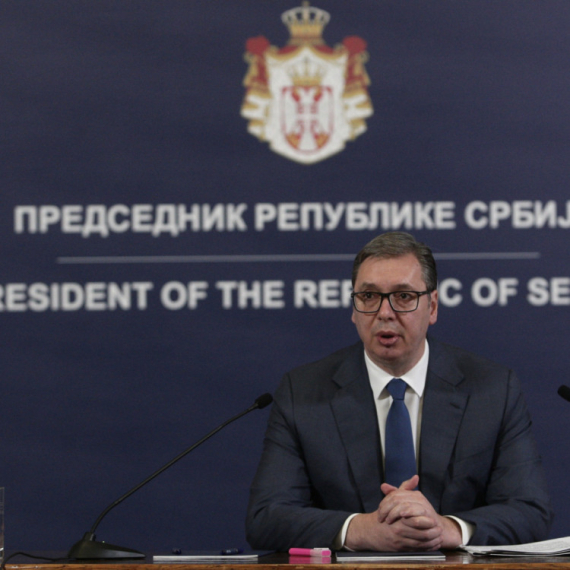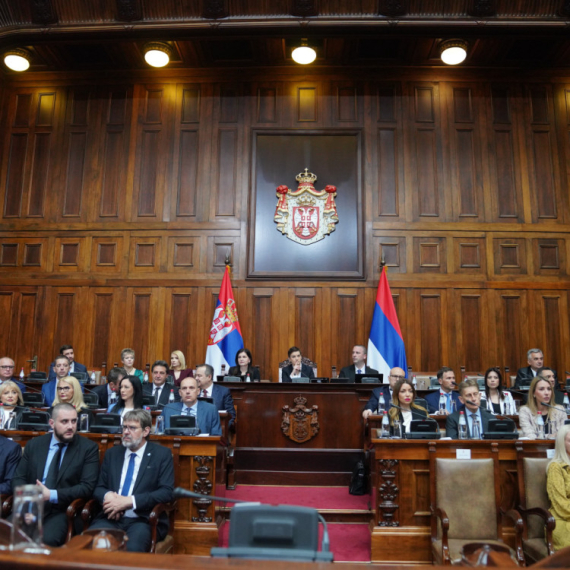Experts against taxing of offshore companies
The practice of imposing taxes on offshore companies is unheard of anywhere in Europe, economic experts have told B92.
Thursday, 25.11.2010.
12:14

The practice of imposing taxes on offshore companies is unheard of anywhere in Europe, economic experts have told B92. This reaction came after announcements from Finance Minister Diana Dragutinovic that her ministry was drafting a new corporate tax law. Experts against taxing of offshore companies Many members of the government are still unfamiliar with the draft. They told B92 that only the finance minister was informed about the content of the law. Its purpose should be to change corporate taxes for those companies based in offshore tax havens. The European Economic Institute points out that it would be much better for Serbia to regulate the work of offshore companies instead of introducing new taxes which could discourage new investments. Places such as Cyprus and Virgin Islands are the choice of businessmen who do not wich to pay corporate taxes, but Serbia is the right place for them to do business, because the work of offshore companies is not regulated here. European Economic Institute’s Dragomir Jankovic believes that the state should not tax such companies but encourage them to invest instead “despite them being tycoons, since the state tolerates them”. EUR 216mn have been transferred from Serbia to the accounts of companies with headquarters in tax havens since the beginning of the year, shows the central bank (NBS) data. The amount has been significantly higher in the past three years when some EUR 1bn was transferred from the country to offshore accounts. Jankovic points out that additional taxation of offshore companies would be meaningless because other foreign investments could be driven away. “Foreign investors do not fear high taxes but of whether they are constant and permanent. At the beginning of a fiscal year each person who invests in Europe knows that they will finish the fiscal year under the same conditions,” he explained. “The question here is how stimulative that would be for foreign and domestic investors - and it certainly would not be, because every time you come down on incomes, you discourage investment. I think that it will have a direct effect on the fall (in investments) which is already drastic,” Jankovic pointed out. All EU member states had to accept complex rules to regulate the work of offshore companies. There are 680 companies registered in Cyprus currently doing business in Serbia. Two companies that build the most here are Delta Holding and MPC. They, however, do not have a mother company in Serbia. They are only registered here but owners are offshore companies in Cyprus and the Netherlands. That way, everything acquired by them in Serbia is today formally owned by foreign companies, i.e. their offshore firms. The state budget potentially loses millions of euros thanks to this kind of business, although it is legal. Should any of these companies decide to sell their Serbian operations - which are estimated to be worth billions of euros - they would pay neither taxes nor taxes on capital gain.
Experts against taxing of offshore companies
Many members of the government are still unfamiliar with the draft.They told B92 that only the finance minister was informed about the content of the law. Its purpose should be to change corporate taxes for those companies based in offshore tax havens.
The European Economic Institute points out that it would be much better for Serbia to regulate the work of offshore companies instead of introducing new taxes which could discourage new investments.
Places such as Cyprus and Virgin Islands are the choice of businessmen who do not wich to pay corporate taxes, but Serbia is the right place for them to do business, because the work of offshore companies is not regulated here.
European Economic Institute’s Dragomir Janković believes that the state should not tax such companies but encourage them to invest instead “despite them being tycoons, since the state tolerates them”.
EUR 216mn have been transferred from Serbia to the accounts of companies with headquarters in tax havens since the beginning of the year, shows the central bank (NBS) data.
The amount has been significantly higher in the past three years when some EUR 1bn was transferred from the country to offshore accounts.
Janković points out that additional taxation of offshore companies would be meaningless because other foreign investments could be driven away.
“Foreign investors do not fear high taxes but of whether they are constant and permanent. At the beginning of a fiscal year each person who invests in Europe knows that they will finish the fiscal year under the same conditions,” he explained.
“The question here is how stimulative that would be for foreign and domestic investors - and it certainly would not be, because every time you come down on incomes, you discourage investment. I think that it will have a direct effect on the fall (in investments) which is already drastic,” Janković pointed out.
All EU member states had to accept complex rules to regulate the work of offshore companies.
There are 680 companies registered in Cyprus currently doing business in Serbia.
Two companies that build the most here are Delta Holding and MPC. They, however, do not have a mother company in Serbia. They are only registered here but owners are offshore companies in Cyprus and the Netherlands.
That way, everything acquired by them in Serbia is today formally owned by foreign companies, i.e. their offshore firms.
The state budget potentially loses millions of euros thanks to this kind of business, although it is legal.
Should any of these companies decide to sell their Serbian operations - which are estimated to be worth billions of euros - they would pay neither taxes nor taxes on capital gain.


























































Komentari 3
Pogledaj komentare